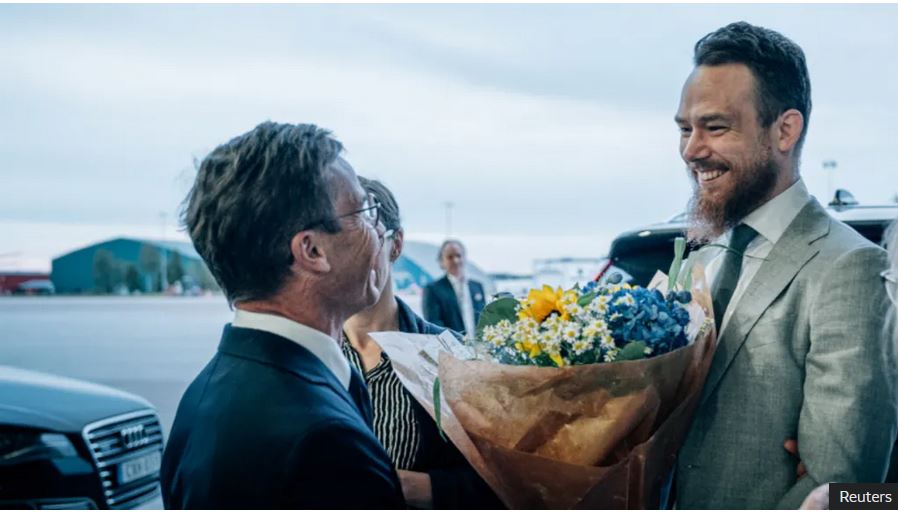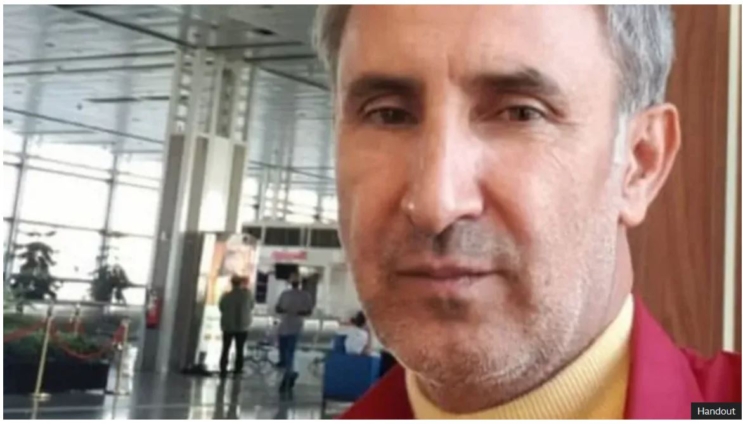An Iranian convicted in Sweden of war crimes has been freed as part of a prisoner swap between the two countries.
Hamid Noury, who was serving a life sentence, has returned to Tehran while Johan Floderus, a Swedish diplomat and dual national Saeed Azizi arrived back in Stockholm late on Saturday evening.
Mr Noury was arrested in Sweden in 2019 and convicted of involvement in the mass execution of political prisoners in Iran more than three decades ago.
Mr Floderus was detained in Iran two years ago on charges of spying while Mr Azizi was arrested last November and sentenced to five years in prison.
Relations between Sweden and Iran have deteriorated since Mr Noury's conviction.
Announcing the swap, Sweden's Prime Minister Ulf Kristersson said Iran had made Mr Floderus and Mr Azizi "both pawns in a cynical negotiation game, with the aim of getting Iranian citizen Hamid Noury released from prison in Sweden".
He added: "He is convicted of serious crimes committed in Iran in the 1980s."
Kazem Gharibabadi, secretary of Iran's High Council for Human Rights, said in a post on X, formerly Twitter, on Saturday that Mr Noury had been "illegally detained" in Sweden but was now free.
Mr Noury was accused of committing war crimes and murder in 1988 when, according to Swedish prosecutors, he was assistant to the deputy prosecutor at Gohardasht prison in Karaj.
He was the first person to face prosecution for participating in the execution of thousands of prisoners, which Iran's establishment has never formally acknowledged.
In 1988, the Mujahedin-e Khalq (MEK), an Iraqi-backed leftist opposition group, had attacked Iran during the Iran and Iraq War.
Iran's then-Supreme Leader Ayatollah Ruhollah Khomeini issued an order to execute all prisoners who were loyal to or sympathised with the group.
Human rights groups estimate that between 2,800 and 5,000 women and men were executed at sites, including Gohardasht prison, between July and September 1988.
Mr Noury, 63, was arrested after arriving at Stockholm airport on a flight from Iran. He denied the charges against him but he was found guilty of "grave breaches of international humanitarian law and murder".
He was tried under the principle of universal jurisdiction which allows countries to prosecute people for serious crimes against international law that took place elsewhere.
This includes war crimes, genocide, torture and crimes against humanity.

Mr Floderus, 33, was facing the death penalty after his arrest in Iran in 2022 on accusations of espionage while he was on holiday.
Mr Azizi, an Iranian-Swedish national in his early 60s, was found guilty of “assembly and collusion against national security”.
Oman helped negotiate the prisoner swap and played a key role in the release of another European national last week. French banker Louis Arnaud was freed after two years in detention in Iran.
Latest Stories
-
Climate expert cautions public against use of tainted glasses in residential buildings
1 minute -
Cedi appreciation driven by mixed domestic and global factors – Prof. Quartey
4 minutes -
Uphold human rights in migrant removals – CHRAJ urges authorities
5 minutes -
EU experts praise Ghana’s 2024 elections
6 minutes -
Ato Forson achieved in 4 months what Bawumia failed to do in 8 years – Osman Ayariga
7 minutes -
Famous Apple designer Sir Jony Ive joins OpenAI
20 minutes -
Target sales hit as Trump tariffs take effect
33 minutes -
Nike to hike prices as it faces tariffs uncertainty
44 minutes -
UK sea temperatures soar after exceptionally warm Spring
55 minutes -
Starmer announces U-turn on winter fuel payment cuts
1 hour -
‘CJ may want cameras, but the constitution knows better’ – Amaliba insists on private hearings
1 hour -
CJ removal: ‘Democracy is not the law’ – Abraham Amaliba warns against constitutional overreach
2 hours -
Former DR Congo PM sentenced to hard labour on corruption charge
2 hours -
M&S website completely down, leaving users unable to browse
3 hours -
Two Israeli embassy staff shot dead in attack at DC Jewish museum
3 hours

